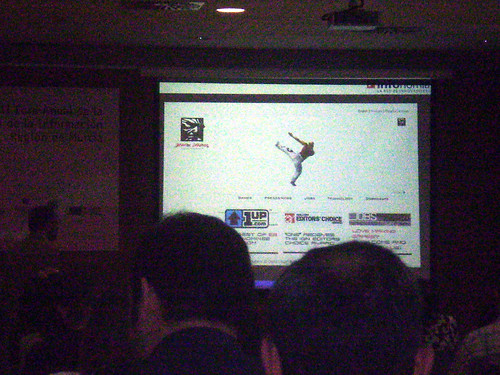Consoles are for fun but what may have therapeutic potential? A medical team Bellvitge University Hospital has developed an interactive video game computer as an adjunct to psychological treatment in patients with eating disorders or gambling. Preliminary results of a clinical trial developed from September 60 persons (30 patients and 30 control) are positive and show that this new game influences the reactions of patients and may have therapeutic efficacy or even prevent relapses.
The computer video games, called the Island, has been developed over the past four years under the umbrella of PlayMancer European consortium, made up of scientists and technicians from six countries. The project has been funded by the 7 th Framework Programme of the European Union and the Instituto de Salud Carlos III, Ministry of Science and Innovation.
So far we have used the new technologies (mobile telephony, Internet and virtual reality) as complementary tools for the treatment of affective disorders and anxiety disorders, eating disorders, hyperactivity, substance abuse, psychotic disorders and dementia, also used in the treatment of diseases such as cancer, chronic pain and physical rehabilitation.
But it is the first time that one specifically developed to integrate it into a psychological therapy and also interacts with the patient's emotions through biosensors. The scenario Islands, according to preliminary tests, it is appropriate to induce and regulate emotional states in people with eating disorders and pathological gamblers, such as anger, anger or boredom.
In both cases, are disorders with a significant disorder. The goal of treatment is to improve the management of negative emotions, tolerance to frustration and boredom, capacity planning and impact assessment of the short to medium term, coping styles, stress (emotional self-control, delay of response, ability of sensory relaxation and self-observation, alternative thinking and decision making).
The therapy lasts four months and before each weekly session with the therapist, the patient (aged between 18 and 35) plays for 20 to 30 minutes under medical supervision. During the game, a series of biosensors record their physiological responses like heart rate or breathing, and also detect facial expressions and voice.
That is, the patient's emotional reactions influence the development of the game. The object is to leave an island, "but not at any price," says Fernando Fernandez Aranda, head of the Unit Eating Disorders hospital and one of the sponsors. This is not the end of the game in the shortest time possible, but the patient learns to control their impulses and react with self-control and composure in stressful situations and frustration, added Fernandez.
In one test, you must dive into the sea: if you are too stressed or too rapidly, the oxygen bar goes down. Of oxygen depletion, the program sends the patient to a relaxation area where you must breathe deeply to try to draw a constellation in the sky and continue the game. By conventional cognitive-behavioral therapy, between 75% and 80% of patients beyond the gambling, says Susana Jiménez Murcia, head of the Pathological Gambling Unit of the hospital and a clinical project managers.
With regard to bulimia nervosa and other eating disorders, usually recover 65% of patients, said Fernando Fernandez. The complementary use of the game can increase the effectiveness of therapy, researchers say. 


The computer video games, called the Island, has been developed over the past four years under the umbrella of PlayMancer European consortium, made up of scientists and technicians from six countries. The project has been funded by the 7 th Framework Programme of the European Union and the Instituto de Salud Carlos III, Ministry of Science and Innovation.
So far we have used the new technologies (mobile telephony, Internet and virtual reality) as complementary tools for the treatment of affective disorders and anxiety disorders, eating disorders, hyperactivity, substance abuse, psychotic disorders and dementia, also used in the treatment of diseases such as cancer, chronic pain and physical rehabilitation.
But it is the first time that one specifically developed to integrate it into a psychological therapy and also interacts with the patient's emotions through biosensors. The scenario Islands, according to preliminary tests, it is appropriate to induce and regulate emotional states in people with eating disorders and pathological gamblers, such as anger, anger or boredom.
In both cases, are disorders with a significant disorder. The goal of treatment is to improve the management of negative emotions, tolerance to frustration and boredom, capacity planning and impact assessment of the short to medium term, coping styles, stress (emotional self-control, delay of response, ability of sensory relaxation and self-observation, alternative thinking and decision making).
The therapy lasts four months and before each weekly session with the therapist, the patient (aged between 18 and 35) plays for 20 to 30 minutes under medical supervision. During the game, a series of biosensors record their physiological responses like heart rate or breathing, and also detect facial expressions and voice.
That is, the patient's emotional reactions influence the development of the game. The object is to leave an island, "but not at any price," says Fernando Fernandez Aranda, head of the Unit Eating Disorders hospital and one of the sponsors. This is not the end of the game in the shortest time possible, but the patient learns to control their impulses and react with self-control and composure in stressful situations and frustration, added Fernandez.
In one test, you must dive into the sea: if you are too stressed or too rapidly, the oxygen bar goes down. Of oxygen depletion, the program sends the patient to a relaxation area where you must breathe deeply to try to draw a constellation in the sky and continue the game. By conventional cognitive-behavioral therapy, between 75% and 80% of patients beyond the gambling, says Susana Jiménez Murcia, head of the Pathological Gambling Unit of the hospital and a clinical project managers.
With regard to bulimia nervosa and other eating disorders, usually recover 65% of patients, said Fernando Fernandez. The complementary use of the game can increase the effectiveness of therapy, researchers say.



No comments:
Post a Comment